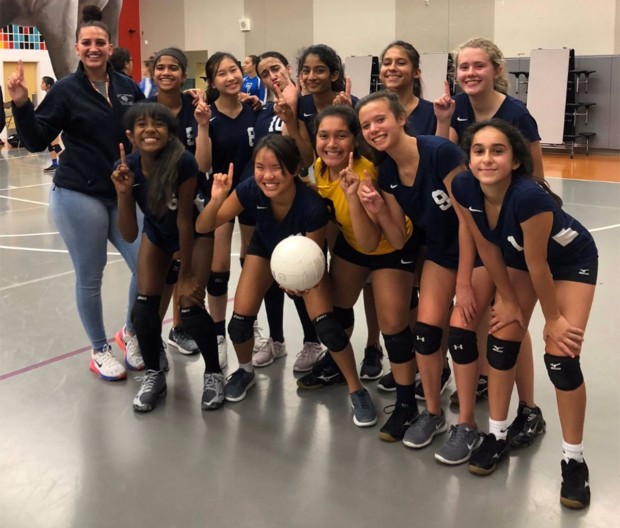Advice for Incoming Freshmen


Tina Li bonded with teammates on the volleyball team at Carnegie Vanguard High School. Pictured (top row, from left) Coach Zina Grammi, Sonya Keswani, Emily Zhou, Lizzie Giorgberidze, Ishita Uddarraju, Jacqueline Gonzalez, Rowan Holland; (bottom row, from left) Kennedy Kyle, Tina Li, Katya Flores, Caetlin Dorn, Taura Borman.
As school is about to begin, and I enter my sophomore year, I can’t help but reminisce on my year as a freshman in high school. My time as a freshman was never as dramatic as Hollywood paints other freshman years to be. To the extent of my knowledge, there was no escapades into school to steal the homework answers, no food fights, and no prison-like detentions. In fact, if anything, my freshman year was rather demure. That, however, is not to say that I did not struggle any. I write this article hoping that some of the advice given can aid incoming freshmen at any high school, Hollywood or not.
Care about it.
In the meager one year that I’ve been in high school, the biggest issue I’ve seen in my peers is that some of them just don’t care. The saying “too cool for school” really doesn’t apply in real life if you want to do well. Doing your best in school, and particularly in high school, has to come from yourself. Parents and teachers can only support and push you so far. After a certain point (I’d say after the first week), you need to take initiative. Caring can come from the smallest habit changes: tracking your workload yourself through an agenda, scheduling your own tutoring, etc. Caring about it shows that you are willing to make the effort, and making the effort shows that you care.
Perhaps the most annoying thing that happens at my school is that kids brag about low grades or about how little sleep they get. My dad calls it competitive deterioration: the competition of who can deteriorate the most and hang on longer. It’s a completely irresponsible habit that does more harm unto you than is worth. Care about school, your health, and just life in general.
Friends will come and go.
There is perhaps one thing Hollywood got at least partially correct: in high school, people grow apart. Perhaps not into heavy cliques, with the plastics, the jocks, the band kids, and so on (Mean Girls, anyone?), but people do tend to hang out with people who share their interests. It’s something that often can’t be helped. However, if you are concerned with struggling to make friends, as cliché as it sounds, you should try joining a club or team that meets before school begins. Personally, I was on the volleyball team, which had summer practices and tournaments. By the time school came around, I already knew a group of 12 amazing girls to hang out with.
The other thing is that the friends you make in the first week of school will most likely not be the friends you’re the closest with by the end of freshman year. By matters of schedule adjustments, class differentiation, and just time spent, those people and yourself may just drift apart gradually. As long as you remain kind and open minded to all those around you, there really is no reason to fear change.
Know your time constraints.
High school offers a plethora of new opportunities: a better theater program, a variety of clubs to join, more events to attend. At first glance, one may desire to join all of the above. However, it is important to note that not everything requires the same amount of effort. Some may require less, some may require more, and some may require way, way more. Be careful not to overcommit yourself to so many activities. For example, at my school, theater takes center stage, with our theater department winning first in state for three years. As freshmen, the only possible positions offered are as stagehands in a 4.0 class called Tech Theater. Stagehands often stay late in school to finish backgrounds and build stage props, until 9:00 during competition seasons. Students that wish to move towards the company level must make even more effort in order to be the select 3 to 4 to be invited to competitions. If one were to commit to that class, as well as other extracurriculars, it gets stressful and difficult to manage a good academic standing.
Personally, I recommend joining no more than two clubs, three at most. For a bit of context, besides writing for School Buzz, I was also a principal second violinist of a chamber orchestra, which required roughly 6 hours a week, as well as a club swimmer (8-10 hours a week), tennis player (a wavering 4 hours a week), and volleyball player (12 hours a week during season). For me, the 3 clubs I joined were clubs that I already had invested time and effort into maintaining (I joined the music club, the USA Biology Olympiad, and a freshmen help club). Be sure to keep in mind that clubs often have weekly meetings in the middle of lunch and such, which may be time you wish to use to relax in particularly stressful exam weeks.
Teachers are there to teach, not ruin your life.
Despite the endless list of homework and essays they require you to finish, teachers are there to help you. I find that avoiding speaking or thinking about your teachers in an objectively negative manner is a catalyst for disaster in academics. Indeed, you are possibly the only person who believes your teacher is “after” you, if that’s the case. Build a respectful and courteous relationship with your teachers at the least. After all, they are the one’s grading your work. After not getting paid enough and having to deal with 100 other students, having an extremely negative student is the last thing a teacher would want.
Most importantly, it is important to ask for help when needed. Make sure to do it at the right time, however. Get to know when the teacher is free and work from there. Also, grades are a personal and private manner. If you are going to your teacher to consult or talk about grades/grade changes, don’t do it in front of a whole class. Wait. It’s going to be fine.
Use your resources.
When it comes to exams, there is often a gold mine of resources outside of what is provided by your teacher. Quizlet has a multitude of practice questions, and if you’re lucky enough you may find the questions from past exams at your school. Just type in one or two questions from past tests and quizzes, and a list of matched sets will appear. If you look carefully, textbooks provided by the school will also sometimes have an online workbook or corresponding review questions. Upperclassmen are also another fabulous source. All the past notebooks, quizzes, and tests that we were given back at the end of freshman year just lie around in a pile in the corner of our rooms, waiting to be recycled or burned. Don’t be afraid to request for a glance at any material we have. Most of us would be happy to get rid of this stuff anyways.
Numbers aren’t everything.
At the end of the day, high school should be seen as a new chapter, an exciting experience. While stats and grades are important, they aren’t the only factor that will make or break your year. Get to know new people, explore new avenues of interests, make memories. Freshman year is the beginning to a quick four years. Try not to overreact to small errors or changes: it isn’t that big of a deal, I promise. I don’t think anyone will ever be able to list out step by step how to have the perfect freshman year, but hopefully this guide has given you a bit of inspiration. Part of the journey is figuring it all out.
Want more buzz like this? Sign up for our Morning Buzz emails.
To leave a comment, please log in or create an account with The Buzz Magazines, Disqus, Facebook, or Twitter. Or you may post as a guest.


